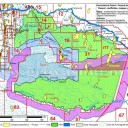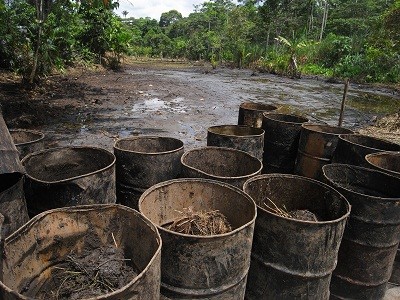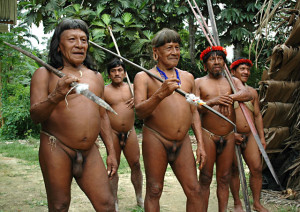As the Ecuadorian government begins drilling for oil in the Yasuni National Park – one of the most biodiverse regions on Planet Earth – human rights lawyer Luis Xavier Solis Tenesaca discusses the existential threat of genocide facing the uncontacted tribes within this UNESCO World Biosphere Reserve.
1. Indigenous Nationalities of Ecuador.
![Waorani in the initial stages of contact [photographer unknown]](https://www.chekhovskalashnikov.com/wp-content/uploads/2013/11/huaorani-tribe-spears1.jpg)
Historically Ecuador and its governments have failed to clearly address the “problems of nationalities and peoples” who live in its geographical territory.
According to the Confederation of Indigenous Nationalities of Ecuador (CONAIE) the country has 14 indigenous nationalities 9 of which live in the Amazon like the Waorani.
The issue of nationalities has experienced several legal, anthropological, and political debates about indigenous rights.
More recently oil exploitation in the Yasuni and the ITT region has reignited this debate about the fate of at least one nationality and two peoples – the Waorani Nationality of which the Taromenane and Tagaeri uncontacted tribes are apart.
 A recent report by Ecuadorian anthropologists indicates that there are at least four isolated groups in the Yasuni National Park while other researches mention seven:“Katty Álvarez, a researcher in the lower basin of the Amazon, has identified groups making up families of uncontacted tribes. For example, exist Iwene group, known as ‘the people of coconuts’, in [petroleum] blocks 14 and 17″
A recent report by Ecuadorian anthropologists indicates that there are at least four isolated groups in the Yasuni National Park while other researches mention seven:“Katty Álvarez, a researcher in the lower basin of the Amazon, has identified groups making up families of uncontacted tribes. For example, exist Iwene group, known as ‘the people of coconuts’, in [petroleum] blocks 14 and 17″
Towards the border with Perú there is the Feromenani group, with its main anatomical feature being small earlobes, being very similar to the Tagaeris, confirmed the researcher. These groups live among the Napo and Tigres basin. Further south, however, there would be another group living in isolation called the Pananjuri of the Arabela linguistic branch.”
The one thing common to all uncontacted tribes and peoples living in voluntary isolation is that they are indigenous, and assuming their existence in this special situation, more attention should be given to any policy to do with their rights, their land, and the environment where they live.
1.1. Indigenous Peoples Living in Constrained or Voluntary Isolation:
To characterize the complexity of the question of uncontacted tribes an accurate description is necessary for its comprehension. The Guidelines of protection for indigenous peoples in isolation (OHCHR, 2012) state:[quote]”for these peoples, isolation is not a voluntary option but a survival strategy (para. 8)”
“While there is no consensus on the term to be used to refer to these people, in the international arena the most commonly used concept is “peoples in isolation.” In some countries they are known as, inter alia, free people, uncontacted, hidden, invisible, in voluntary isolation. Despite the different formulations, all refer to the same concept (para. 9)”[/quote]
Lets focus on: “for these peoples, isolation is not a voluntary option but a survival strategy”
The Tagaeri and Taromenane and other newly identified peoples would be within this category or concept so it is important to take into account legislation and how to implement it.
The United Nations has said that these peoples called names like hidden, isolated, and free are living in isolation for survival over desire: survival from diseases, food shortages from illegal hunting, timber harvesting, mining and quarrying, environmental contamination, which is common to indigenous peoples in Latin America and the world.
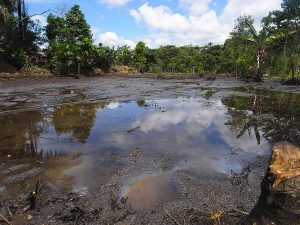 The survival of the Taromenane has been greatly threatened by events like the last oil spill SOTE of May 31, 2013, which according to official versions consisted of 10,000 barrels of oil that ended up in the Coca and Napo Rivers reaching Brazil and contaminating the water supply downstream that uncontacted tribes use to drink.
The survival of the Taromenane has been greatly threatened by events like the last oil spill SOTE of May 31, 2013, which according to official versions consisted of 10,000 barrels of oil that ended up in the Coca and Napo Rivers reaching Brazil and contaminating the water supply downstream that uncontacted tribes use to drink.
Other than fixing the pipeline no public or private institution has attempted to clean this spill.
2. The Human Rights of the Waorani, Tagaeri-Taromenane and other Uncontacted Tribes
In legal terms we would say that all human rights, international treaties, the Ecuadorian Constitution, as well as Inter-American Court rulings, fully apply to indigenous peoples and that we need to defend their rights whether they have made contact or still live in isolation.
Indigenous peoples however rarely share the same situation as the common folk of a country. We can talk about legal equality but overlook a history of discrimination, exploitation, genocide, poverty and violations of their ancestral rights which require special legislation to take into account these needs.
In the case of contacted tribes there exists the ILO Convention N.169 and several judgements from the Interamerican Court of Human rights but for uncontacted tribes there is no legislation, despite a greater need for their protection.
Currently there is the United Nations Declaration on the Rights of Indigenous Peoples adopted at the 107th. plenary session on September 13, 2007, a project of the Organization of American States. They do not however expressly mention uncontacted tribes or isolated peoples except for nomadic peoples in which we can legally categorize isolated peoples even though its lacking.

Something to keep in mind is that indigenous peoples have their own rights which were forged over its history, customs, culture, being the social norm in their groups. Customary law can also be applied in cases of their territories.
The violence against their human rights has been a constant threat to these people over history (oil companies seeking to enter their territory, the Summer Institute of Linguistics, state controlled oil companies, NGOs, government and the list goes on) these practices have led to the extermination of native peoples.
In the case of uncontacted tribes, very few human rights violations have been made public such as the massacre of Taromenane on 29, 2013. The jungle however obscures many more events: disputes with loggers, big oil, the army, drug trafficking and narco-gangs as well as water pollution.
2.1. Stop Racism and Discrimination
Throughout history indigenous peoples have suffered discrimination from their colonizers, treating them as inferior and with less rights – evident today in Orellana province for the Waorani. With an industry like oil where land grabs are made by multinationals that utilize trickery and the bribing of indigenous leaders to divide and conquer the community.
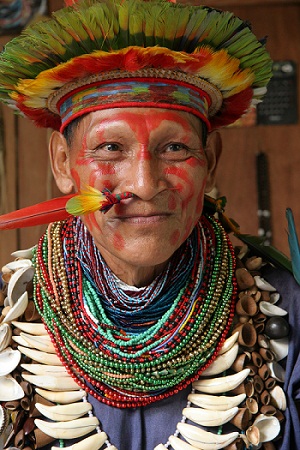 Racism adds to the discrimination of poverty in which recently contacted tribes face a lack of basic services like potable clean water, sewerage and sanitation systems as well as education and health.
Racism adds to the discrimination of poverty in which recently contacted tribes face a lack of basic services like potable clean water, sewerage and sanitation systems as well as education and health.
Technology however is often accessible to these groups and it’s not strange to see younger generations with telephones in a community without clean drinking water.
The government policy on education remains standardized and does not respect the Waorani culture. Most schools in the Amazon employ incompetent teachers – except for a few schools funded by the oil company Repsol in Block 16. Other communities have a low educational level which glosses over the local culture, language, and teaching methods.
In the case of isolated peoples discrimination and racism is everywhere and is more noticeable when they are not even factored into oil exploration plans disrespecting their territory.
At times this has entered the level of farce when the deaths of members of these villages cannot be investigated because they do not have identity cards as the public prosecutor said in 2003. In another recent case prosecutors have denied the existence of these isolated peoples and even though there is evidence of crimes it has not convicted one illegal logger, oil worker or military man, for violating the Yasuní protected territory or providing modern weapons to the Waorani to kill the Taromenane.
Left behind is Article 66 paragraph 4, and 57 paragraph 2 of the Ecuadorian Constitution on formal equality, material and non-discrimination, the right pending to comply – the state must move from being a discriminatory state on the ground and ensure the equality mentioned in its constitution.
2.2. Self-Determination
On the right of self-determination there has existed various ideas, among them the right of the total independence of a people to form a new state, their own.
For the right of indigenous peoples we refer to the right to control their institutions, territories, resources, social justice, culture without interference or external domination and their right to establish their relationship with the dominant society and the state is on the basis of consensus.
This is to say not total independence of a state but the recognition and legal protection of their rights internationally given the vulnerability of many indigenous peoples.
In the case of uncontacted tribes different authors say that the ultimate expression of self-determination is the right to respect their decision to remain in isolation, as they know of the existence of other peoples or cowori (strangers) but the will of the State is kept at a distance. The right to remain isolated as Berraondo Mikel says [quote]”… is the ultimate expression of the right to self-determination that becomes the key that guarantees respect for traditional ways of life and social and political organization. While respecting their decision to remain isolated, uncontacted peoples retain their traditional systems of organization … and respect for their decision may be understood as recognition or legitimacy of their own systems of government and organization by external actors and governments of states whose territories are the territories of uncontacted peoples.”[/quote]
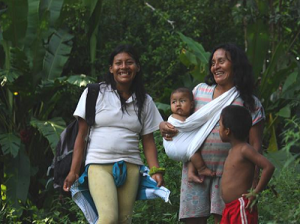
With the peoples in initial contact such as the Waorani (pictured right) their right to self-determination, to exercise their own organization, has been hit hard by the oil industry.
This industry has violated traditional organizational forms, though in rare cases they consult the Pikenani (elders) when making decisions.
The state has been very negligent in caring for people in the initial stages of contact, leaving them to their fate, in which there has been a failure to act in cases where ethnocide has occured like what happened to the now extinct Tetete tribe and similar to what is currently happening with the Taromenane.
2.3. Territory and Environment
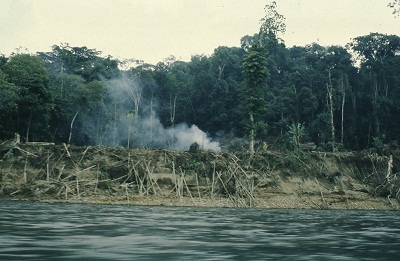
Territory and environment are considered as one for Ecuador’s indigenous peoples, they correlate and all activities develop around them. The law is understood as for the collective and not the individual.
This right is considered a right for indigenous solidarity – to sustain the environment for future generations.
This right has always existed in the customary rights of tribes and their are many historical cases of their defense, although currently there are no maps, no paths, no landmarks to delineate the borders between Taromenane, Tagaeri or Waorani territory.
These people fight in defense of their ancestral lands, to maintain their privacy, preserve the land for their future generations. As was made clear in a remarkable video filmed of the late Chief Ompure of the Waorani, believed to be the only person on the planet who was in contact with the Taromenane.
Chief Ompure was later murdered which led to a massacre of uncontacted Taromenane and the kidnapping of two Taromenane girls.
The Ecuadorian government has stalled answering simple questions about whether natural resources found in indigenous territories, especially that of uncontacted tribes, will be leveraged across the country. The answer to those questions can be found in a recent case on Sarayacu territory where upon explosives were used without consent or or respect for those that inhabited the area.
The Interamerican Court said in its final sentence that this was a violation of territorial rights and it has to be emphasized that the resources found in indigenous territories also belong to these people.
[quote]Article. 57 of the Ecuadorian Constitution
“The territories of the peoples in voluntary isolation are irreducible and intangible and they shall be closed to all extractive activities. The state has adopted measures to guarantee there lives, enforce their self-determination and will to remain in isolation and safeguard the enforcement of their rights. The violation of these rights shall constitute the crime of ethnocide which will be criminalized by law.”[/quote]
The ILO Convention 169 guarantees the right of indigenous or native peoples to own and control without limits their lands and territories in art. 13 as well as articles 10, 25, 26, 27, 28 and others in the United Nations Declaration on the Rights of Indigenous Peoples.
2.4. Culture
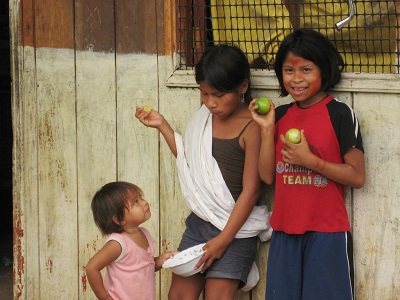 The establishment of homogenous states where everybody speaks a single language, receives standardized education, and live similar conformist lifestyles is one of the victories of capitalism ending the kind of cultures that oppose their system.
The establishment of homogenous states where everybody speaks a single language, receives standardized education, and live similar conformist lifestyles is one of the victories of capitalism ending the kind of cultures that oppose their system.
The homogenous culture favours development of the capatilist state and the free market where consumption becomes more important than creativity.
The most affected have been indigenous peoples because more than just struggling to survive they are seeking to save what is left of their culture.
[pullquote align=”right”]Here we must also remember the violation of intellectual property: recent research reveals that the Waorani had blood samples taken from them without permission by people close to the Summer Institute of Linguistics.
These blood samples were sent to laboratories around the world to study their DNA – a clear violation genetic heritage.
[/pullquote]
With uncontacted peoples as we have said, the defense of their culture is closely linked to the defense of their life and their right to self-determination.
The right of uncontacted peoples to exist has been elevated to the category of IUS COGENS in international law so that all states have an obligation to protect the existence of uncontacted peoples, no state can play down its obligation.
All members of the international community must prevent and punish the crime of genocide, which so strongly threatens the existence of uncontacted tribes.
Violating the territory of a people and their self-determination qualifies as ethnocide under our legislation in Ecuador.
The criminalization for ethnocide does not exist and has never been applied even though as stated above there are already cases of tribes disappearing as well as attempts to facilitate the disappearence of uncontacted tribes like the Taromenane and Tagaeri. The crime of genocide should apply to those who blatantly vote for oil exploration in the territories of uncontacted tribes.
2.5. Free and Informed Prior Consent and Consultation
Section 7 of art. 57 of the Ecuadorian Constitution states with regards to indigenous peoples:
[quote]”The free, prior and informed, within a reasonable period on plans and programs of exploration, exploitation and marketing of non-renewable resources that are on their land and that may affect their environment and culture, participate in the benefits deriving from such projects and to receive compensation for damages social, cultural and environmental factors that cause them. The inquiry to be conducted by competent authorities is mandatory and timely. If the consent of the community consulted is not obtained, will proceed according to the Constitution and the law.
A free and informed prior consultation, within a reasonable timeframe, about prospecting plans and programs, the exploitation and comercialization of unrenewable resources that are found on thier land that may affect their environment or culture; to participate in the benefits derived from such projects and receive compensation for damages to social, cultural, and environmental factors caused to them. The consultation to be conducted in a timely manner by competent authorities is mandatory. If consent is not obtained from the community consulted, proceeds must conform with the Constitution and the law.”[/quote]
The Interamerican Court of Human Rights however has stated in several judgments that communities and indigenous peoples should be guaranteed the right to prior consent that is free and informed.
This differs from The Right to Prior Consultation and is mandatory that the consent of communities, a right that best corresponds to indigenous peoples, is a right that is also enshrined Convention 169 of the ILO and the Declaration of the United Nations for Indigenous Peoples.
Prior consent that is free and informed, without harassment that stems primarily from exploitative companies, is a right to all indigenous peoples concerning their territories and resources. Currently this has become a weapon to defend the territories of farms, also it sometimes limits the state and its extractive endeavors, says Mikel Berraondo, an expert on human rights for indigenous villages: [quote]”One of its aims is to regulate and limit the implementation by States using the doctrines of public interest or social need that have become the perfect legal and political instrument to subrogate the rights of indigenous peoples and keep them always in the background to prioritize the rights of the majority.
Consent must be given freely, should be obtained by project implementers prior to the start of activities, and must be granted by the affected villages being based on the full understanding of the broad scope of all the issues involved in the activities or decisions in question. Hence the formulation and free, prior and informed”[/quote]

In many indigenous villages this “consent” has been achieved by force, trickery, lavish gifts and lies. This “consent” is not valid and is in clear violation of the right to be consulted.
Also consent must be given by a majority of the inhabitants but what happens in many cases is the community leader signs a document in exchange for “favors”
¿But what happens to uncontacted tribes? How can we understand the right to free and informed consent? Mikel Berraondo contests that: [quote]“In the case of uncontacted peoples, the critical importance of duel systems to limit and protect facilitates the application of this principal. Limitation, enforces the application of this principle by completely preventing and limiting the possibilities to act on the territories of uncontacted peoples, without their consent one cannot perform any action within their territories, and the pursuit of consent by force or coercion would expose serious human rights violations, among which include the crime of genocide.
And protection, precisely because of the fact that its consent is a prerequisite for any action on their territories means that any intrusion into their territories or cultures means a violation of their rights, among which, as just mentioned, includes the crime of genocide which is generated between violating and acting without consent.”[/quote]
As Mikel Berraondo states in the case of indigenous peoples there must be free and informed prior consent and in the case of uncontacted tribes there can be no type of exploitation on their territories or of their resources.
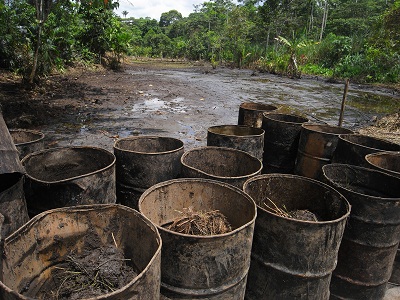 Here we must clarify that the right of self-determination for uncontacted tribes means protecting their territory by preventing exploitation and not because there exists a zone declared intangible, which is to say that we must see the right to life of these people, the IUS COGENS.
Here we must clarify that the right of self-determination for uncontacted tribes means protecting their territory by preventing exploitation and not because there exists a zone declared intangible, which is to say that we must see the right to life of these people, the IUS COGENS.
In the case of Ecuador and the Yasuní we can say that we have two arguments against oil extracting activity: the first is based on an executive order declaring the Intangible Zone as well as the fundamental right to self-determination of indigenous Waorani in the region.
The second argument is the right of self-determination for the uncontacted tribes in the region and the protection of the principal of Free and Informed Prior Consultation: Limitation and Protection.
The legal loophole the Ecuadorian government is using to exploit blocks 31 and 43 of the Yasuni ITT is Article 407 of the country’s constitution that states: [quote]”prohibits extractive non-renewable resources in protected areas and areas designated as intangible, including logging, and in exceptional cases exploitation of these resources can be based on a request by the President of the Republic after a declaration of national interest by the National Assembly, which he sees fit may call a referendum.”[/quote]
But this foundation is lacking in respect for international norms and treaties ratified by Ecuador. It even contradicts the Ecuadorian Constitution which says the State’s duty is to ensure the human rights enshrined in the Constitution and in international instruments, in accordance with that which is stated in the second clause of articles 424 and 426 of the Constitution of the Republic of Ecuador.
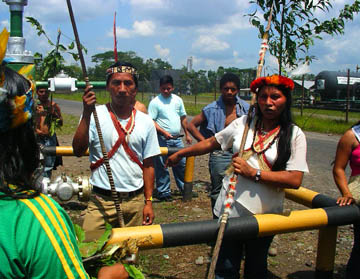 Finally we must alert the world that the 10th Round Table for Oil is coming to tender oil blocks found on indigenous ancestral territories, in some cases the blocks cover the entire territory.
Finally we must alert the world that the 10th Round Table for Oil is coming to tender oil blocks found on indigenous ancestral territories, in some cases the blocks cover the entire territory.
16% of Waorani territory will be affected by the new petroleum blocks and in the case of the Achuar, Andoas, Shiwiar y Zapara nationalities these blocks will occupy all of their territory.
The Ecuadorian government has said it carried out a prior consultation, but not the procedure it should have done, so this round again violates the rights of indigenous peoples.
All this is happening in the beurocratic jungle of paper and decrees while environmentalists and NGO’s continue the resistance against big oil on the ground in the jungle.
Neither the army nor the police or government have been able to erase from the minds of indigenous people and mestizos the catastrophic contamination caused by petroleum exploitation. In the words of one fighter on the “battlefield” against the petroleum giant Chevron Texaco: [quote]“We’ll fight this until hell freezes over and then we’ll fight it on the ice.”[/quote]
[mc4wp_form]

